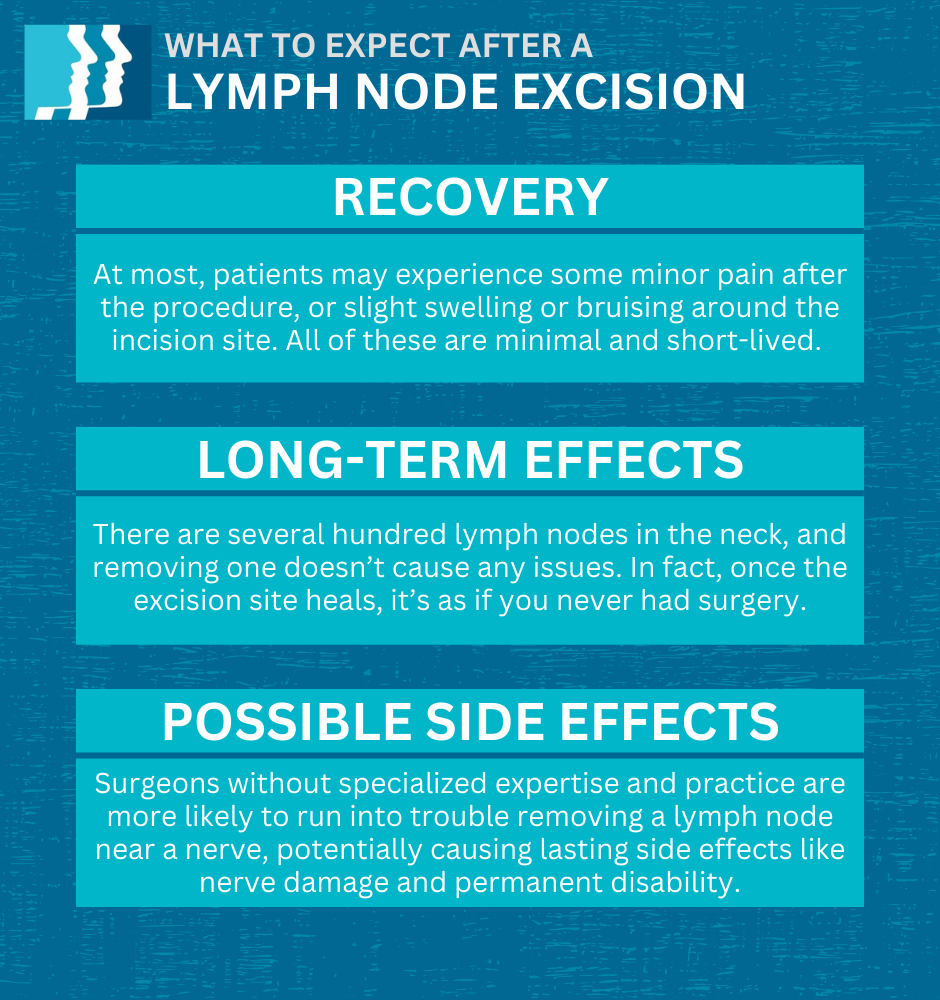Pediatric vs. Adult Lymph Node Excisions: Does Age Matter?

Certain medical terms, like “lymph node excision,” can sound intimidating and scary, especially when you’re exploring surgical treatment for a child. Plus, you might wonder about the potential impact of the procedure on a child versus an adult.
To clarify, a lymph node excision is the surgical removal of a lymph node — a small, bean-shaped structure that filters lymph fluid and helps your body fight infection. And when a qualified ENT performs a lymph node excision, there’s minimal risk, whether you’re an adult or a child.
That said, it’s still a surgery, and we understand you might have concerns when exploring this treatment option. To help ease your anxiety and inform your decision-making process, here are the main differences between pediatric and adult lymph node excisions.
When Is a Lymph Node Excision Necessary?
Lymph nodes often swell naturally as they help your body fight infections, and then return to normal. However, if you have concerning symptoms in your throat or neck, like an unusually swollen or painful lymph node, it’s possible that your ENT may recommend a lymph node excision.
A swollen lymph node could indicate an infection, or it could mean either a benign or cancerous growth is present. If we suspect cancer, we’ll start with a needle biopsy of the lymph node, which often gives us enough information for a diagnosis and may eliminate the need for a lymph node excision.
If the biopsy shows signs of certain cancers, like lymphoma, we’ll need to take out the entire lymph node to examine its whole structure and identify the type of cancer more specifically.
In certain cases of cancer, a more extreme form of lymph node excision, called neck dissection, may be necessary. But that’s a different and much more extensive surgery that involves removing as many lymph nodes from the neck as possible.
What Does Lymph Node Excision Involve for Adults?
The most common reason for an adult lymph node excision is to check for cancer.
During a lymph node excision, an ENT makes a small incision over the swollen lymph node and carefully removes it without damaging the surrounding structures. Next, they rinse the incision area and check that there aren’t any punctured or torn blood vessels before closing the site up with stitches.
With this type of surgery, our office typically uses absorbable stitches, so patients don’t have to come back in to get them removed.
How Is the Procedure Different for Children?
In children, cancer is a far less common reason for lymph node excision. More often, the procedure is necessary in the case of specific infections.
A condition called scrofula, which is a tuberculosis infection of the lymph nodes in the neck, is the most common culprit in kids. Sometimes, we can treat the infection with various antibiotics. Other times, lymph node excision may be necessary instead.
The lymph node excision procedure is the same for children and adults and has no additional risks or side effects.

What to Expect After a Lymph Node Excision
Depending on the situation, a lymph node excision may help your doctor reach a diagnosis, remove a benign or cancerous growth, or treat an infection. Here’s what to expect after the procedure:
Recovery
Although a lymph node excision is a surgical procedure, there’s very little postoperative recovery involved.
At most, patients may experience some minor pain after the procedure, or slight swelling or bruising around the incision site. All of these are minimal and short-lived.
Long-Term Effects
If you’re worried about the potential lasting impact on your health, it’s important to know that a lymph node excision doesn’t impair or compromise the immune system, regardless of whether the patient is an adult or child. There are several hundred lymph nodes in the neck, and removing one doesn’t cause any issues. In fact, once the excision site heals, it’s as if you never had surgery.
Possible Side Effects
ENT surgeons have an intimate understanding of facial and neck anatomy, and specialized surgical training in those specific areas. For this reason, it’s much safer to have a lymph node excision performed by a qualified ENT than by another type of surgeon, such as a general surgeon.
Some lymph nodes are located near important nerves in the neck. Surgeons without specialized expertise and practice are more likely to run into trouble removing a lymph node near a nerve, potentially causing lasting side effects like nerve damage and permanent disability.
Final Thoughts on Lymph Node Excisions
While the prospect of surgery isn’t exactly pleasant at any time, lymph node excisions reside at the low end of the risk spectrum. And, if you seek out an experienced ENT surgeon for the task, you can rest easy knowing that your body won’t even know the difference in a few days.
If you have concerns about a lymph node excision procedure for yourself or your child, we recommend talking to your ENT. They can clarify the reasoning behind the surgery, provide more details on what you can expect, and help you prepare yourself or your child for the procedure.
Dr. Cuthbertson is a physician at Ear Nose & Throat Associates of Lubbock. He joined the team at ENT Lubbock from Houston, where he was chief resident of the prestigious Bobby R. Alford Department of Otolaryngology at Baylor College of Medicine. He is board certified in Otolaryngology and Head & Neck Surgery and has quickly built a reputation, not only as an extremely skilled surgeon, but as an approachable and compassionate clinician adept in the newest standards and technologies. Learn more about Dr. Cuthbertson.
Categories:








